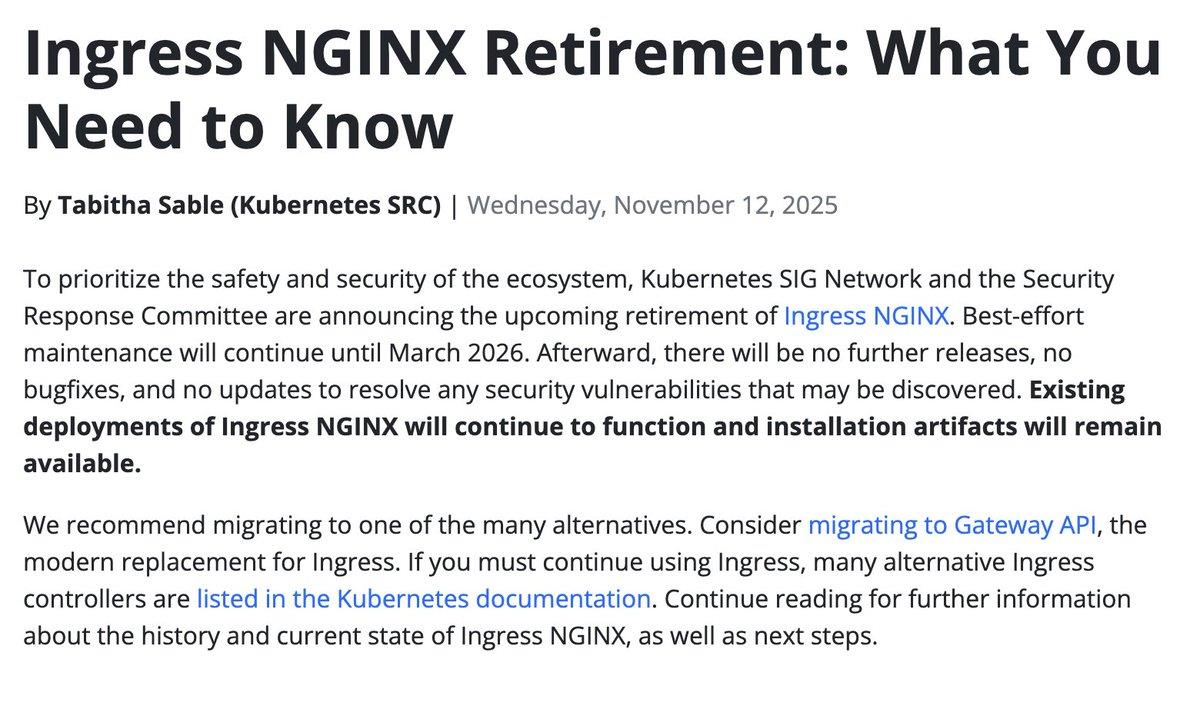
Kubernetes Sets March 2026 Deadline For NGINX Retirement

Kubernetes maintainers have confirmed that Ingress NGINX, a cornerstone of many cloud-native infrastructures, will be retired by March 2026. This decision marks a significant change for developers and organisations relying on the popular ingress controller for managing internal and external traffic in Kubernetes clusters.
Ingress controllers are essential components in cloud-native environments, facilitating the routing of traffic between external users and Kubernetes-based applications. Ingress NGINX, specifically, has been the go-to solution for many due to its flexibility, performance, and scalability. However, the announcement from the Kubernetes SIG Network and Security Response Committee outlines a clear timeline for its deprecation.
The decision to retire Ingress NGINX follows evolving requirements in the Kubernetes ecosystem, as the maintainers seek to streamline traffic management solutions and ensure long-term sustainability for users. Kubernetes has gained immense popularity as an open-source platform for automating deployment, scaling, and operations of application containers, and its network stack has become more sophisticated over time.
The announcement has already prompted developers to explore alternatives for managing ingress traffic. The Kubernetes project encourages users to migrate to alternative ingress controllers or adopt the more recent ingress solutions being integrated into the Kubernetes ecosystem. This transition will require careful planning and execution, as the infrastructure that many businesses rely on is affected by the change.
One of the main drivers behind this shift is the increasing complexity and security concerns surrounding ingress controllers. Kubernetes has seen a rapid expansion in its user base, and with that comes the growing need for more secure, resilient, and manageable traffic routing systems. The Kubernetes maintainers are focusing on developing more robust solutions that offer greater flexibility in handling network policies and security features, which are becoming essential in an era of increasingly complex applications and heightened security threats.
See also Oracle Accelerates Multicloud AI Infrastructure Roll-outIngress NGINX, which has served as a reliable ingress controller for numerous organisations, is seen by many as an integral part of the cloud-native ecosystem. Its popularity was due in large part to its open-source nature, its alignment with best practices in the Kubernetes world, and the extensive community support it garnered over time. However, as the Kubernetes ecosystem matures, newer ingress controllers that offer better performance, security, and features are being prioritised by the maintainers.
This retirement plan is not unexpected, as Kubernetes has previously communicated its intention to deprecate certain older features in favour of newer, more advanced solutions. However, for the thousands of businesses and developers who rely on Ingress NGINX, the retirement brings both challenges and opportunities. The timeline allows organisations ample time to migrate to other ingress controllers, but the process will require significant updates to existing configurations and testing to ensure minimal disruption to service delivery.
As Kubernetes continues to evolve, the development focus has shifted towards supporting more sophisticated ingress solutions, such as Gateway API, which is designed to offer improved functionality and compatibility with a wider range of workloads. Gateway API is being positioned as a more flexible alternative to Ingress, with the potential to cater to more complex and diverse routing needs, particularly in large-scale enterprise environments.
While Kubernetes users face a potential migration challenge, many see it as an opportunity to future-proof their infrastructure. Gateway API, in particular, offers enhanced security, greater traffic control, and deeper integration with Kubernetes-native services, which align with the growing need for cloud-native networking solutions that can scale with the increasing demands of modern applications.
See also Apple Unveils Digital Passport Feature for iPhoneNotice an issue? Arabian Post strives to deliver the most accurate and reliable information to its readers. If you believe you have identified an error or inconsistency in this article, please don't hesitate to contact our editorial team at editor[at]thearabianpost[dot]com. We are committed to promptly addressing any concerns and ensuring the highest level of journalistic integrity.
Legal Disclaimer:
MENAFN provides the
information “as is” without warranty of any kind. We do not accept
any responsibility or liability for the accuracy, content, images,
videos, licenses, completeness, legality, or reliability of the information
contained in this article. If you have any complaints or copyright
issues related to this article, kindly contact the provider above.


















Comments
No comment